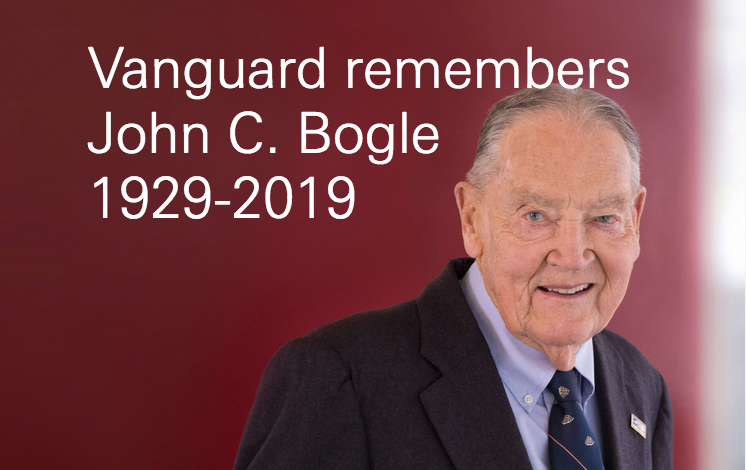John Clifton Bogle, founder of The Vanguard Group, died on January 16, 2018 in Bryn Mawr, Pennsylvania. He was 89.
Mr. Bogle had legendary status in the American investment community, largely because of two towering achievements: He introduced the first index mutual fund for investors and, in the face of skeptics, stood behind the concept until it gained widespread acceptance; and he drove down costs across the mutual fund industry by ceaselessly campaigning in the interests of investors. Vanguard, the company he founded to embody his philosophy, is now one of the largest investment management firms in the world.
“Jack Bogle made an impact on not only the entire investment industry, but more importantly, on the lives of countless individuals saving for their futures or their children’s futures,” said Vanguard CEO Tim Buckley. “He was a tremendously intelligent, driven, and talented visionary whose ideas completely changed the way we invest. We are honored to continue his legacy of giving every investor ‘a fair shake.’”
Mr. Bogle, a resident of Bryn Mawr, PA, began his career in 1951 after graduating magna cum laude in economics from Princeton University. His senior thesis on mutual funds had caught the eye of fellow Princeton alumnus Walter L. Morgan, who had founded Wellington Fund, the nation’s oldest balanced fund, in 1929 and was one of the deans of the mutual fund industry. Mr. Morgan hired the ambitious 22-year-old for his Philadelphia-based investment management firm, Wellington Management Company.
Mr. Bogle worked in several departments before becoming assistant to the president in 1955, the first in a series of executive positions he would hold at Wellington: 1962, administrative vice president; 1965, executive vice president; and 1967, president. Mr. Bogle became the driving force behind Wellington’s growth into a mutual fund family after he persuaded Mr. Morgan, in the late 1950s, to start an equity fund that would complement Wellington Fund. Windsor Fund, a value-oriented equity fund, debuted in 1958.
In 1967, Mr. Bogle led the merger of Wellington Management Company with the Boston investment firm Thorndike, Doran, Paine & Lewis (TDPL). Seven years later, a management dispute with the principals of TDPL led Mr. Bogle to form Vanguard in September 1974 to handle the administrative functions of Wellington’s funds, while TDPL/Wellington Management would retain the investment management and distribution duties. The Vanguard Group of Investment Companies commenced operations on May 1, 1975.
To describe his new venture, Mr. Bogle coined the term “The Vanguard Experiment.” It was an experiment in which mutual funds would operate at cost and independently, with their own directors, officers, and staff—a radical change from the traditional mutual fund corporate structure, whereby an external management company ran a fund’s affairs on a for-profit basis.
“Our challenge at the time,” Mr. Bogle recalled a decade later, “was to build, out of the ashes of major corporate conflict, a new and better way of running a mutual fund complex. The Vanguard Experiment was designed to prove that mutual funds could operate independently, and do so in a manner that would directly benefit their shareholders.”
In 1976, Vanguard introduced the first index mutual fund—First Index Investment Trust—for individual investors. Ridiculed by others in the industry as “un-American” and “a sure path to mediocrity,” the fund collected a mere $11 million during its initial underwriting. Now known as Vanguard 500 Index Fund, it has grown to be one of the industry’s largest, with more than $441 billion in assets (the sister fund, Vanguard Institutional Index Fund, has $221.5 billion in assets). Today, index funds account for more than 70% of Vanguard’s $4.9 trillion in assets under management; they are offered by many other fund companies as well and they make up most exchange-traded funds (ETFs). For his pioneering of the index concept for individual investors, Mr. Bogle was often called the “father of indexing.”
Mr. Bogle and Vanguard again broke from industry tradition in 1977, when Vanguard ceased to market its funds through brokers and instead offered them directly to investors. The company eliminated sales charges and became a pure no-load mutual fund complex—a move that would save shareholders hundreds of millions of dollars in sales commissions. This was a theme for Mr. Bogle and his successors: Vanguard is known today for maintaining investment costs among the lowest in the industry.
A champion of the individual investor, Mr. Bogle is widely credited with helping to bring increased disclosure about mutual fund costs and performance to the public. His commitment to safeguarding investors’ interests often prompted him to speak out against practices that were common among his peers in other mutual fund organizations. “We are more than a mere industry,” he insisted in a 1987 speech before the National Investment Company Services Association. “We must hold ourselves to higher standards, standards of trust and fiduciary duty. Change we must—in our communications, our pricing structure, our product, and our promotional techniques.”
Mr. Bogle spoke frequently before industry professionals and the public. He liked to write his own speeches. He also responded personally to many of the letters written to him by Vanguard shareholders, and he wrote many reports, sometimes as long as 25 pages, to Vanguard employees—whom he called “crew members” in light of Vanguard’s nautical theme. (Mr. Bogle named the company after Admiral Horatio Nelson’s flagship at the Battle of the Nile in 1798; he thought the name “Vanguard” resonated with the themes of leadership and progress.)
In January 1996, Mr. Bogle passed the reins of Vanguard to his hand-picked successor, John J. Brennan, who joined the company in 1982 as Mr. Bogle’s assistant. The following month, Mr. Bogle underwent heart transplant surgery. A few months later, he was back in the office, writing and speaking about issues of importance to mutual fund investors.
In December 1999, he stepped down from the Vanguard board of directors and created the Bogle Financial Markets Resource Center, a Vanguard-supported venture. Mr. Bogle worked as the center’s president—analyzing issues affecting the financial markets, mutual funds, and investors through books, articles, and public speeches—until his death. Mr. Bogle wrote 12 books, selling over 1.1 million copies worldwide.
Industry accomplishments
Mr. Bogle was active in the investment industry. Early on, he served as chairman of the board of governors of the Investment Company Institute from 1969 to 1970. He also served as chairman of the Investment Companies Committee of the National Association of Securities Dealers Inc. (now FINRA) from 1972 to 1974. In 1997, he was appointed by then-SEC Chairman Arthur Levitt to serve on the Independence Standards Board.
Awards
In 2004, Time magazine named Mr. Bogle one of “the world’s 100 most powerful and influential people” and Institutional Investor magazine presented him with its Lifetime Achievement Award. In 2010, Forbes magazine described him as the person who “has done more good for investors than any other financier of the past century.” Fortune magazine designated him one of the investment industry’s four “Giants of the 20th Century” in 1999. In January 2012, some of the nation’s most respected financial leaders celebrated his career at the John C. Bogle Legacy Forum. Among his numerous other awards and honors were:
- Pennsylvania Society Gold Medal for Distinguished Achievement, 2016
- EY Entrepreneur Of The Year Lifetime Achievement Award, 2016
- FUSE Research Network Award for Lifetime Impact and Commitment to Investors and Investment Management Consultants Association Richard J. Davis Ethics Award, 2010.
- National Council on Economic Education Visionary Award, 2007.
- Center for Corporate Excellence Exemplary Leader Award, 2006.
- Yale School of Management, Legends of Leadership, 2003.
- Barron’s Investment Hall of Fame, 1999.
- Woodrow Wilson Award from Princeton University for “distinguished achievement in the nation’s service,” 1999.
- Fixed Income Analysts Society’ Hall of Fame, 1999.
- Award for Professional Excellence from the Association for Investment Management and Research, 1998.
- No-Load Mutual Fund Association’s first Outstanding Achievement Award, 1986.
Civic work
An avid booster of Philadelphia and the surrounding area, Mr. Bogle was active in civic affairs. “I loved Philadelphia, my adopted city that had been so good to me. I established my roots there, finding even more unimaginable diamonds,” he wrote in one of his books.
His civic work extended to organizations involved in education, leadership, and public affairs. He served as the first chairman of the board of trustees and chairman emeritus for the National Constitution Center. He was a member of the American Philosophical Society, American Academy of Arts and Sciences, The Conference Board’s Commission on Public Trust and Private Enterprise, and the investment committee of the Phi Beta Kappa Society. He served as a trustee of the American Indian College Fund, The American College, and Blair Academy.
Corporate board memberships
Mr. Bogle was sought after in the corporate community. He served as a director of Instinet Corporation, Chris-Craft Industries, Mead Corporation, The General Accident Group of Insurance Companies, Meritor Financial Group, Inc., and Bryn Mawr Hospital. He was a trustee for the American Indian College Fund and The American College.
Academic recognition
The academic community recognized Mr. Bogle’s for his accomplishments. He received honorary doctorate degrees from Villanova University, Trinity College, Georgetown University, Princeton University, the University of Delaware, University of Rochester, New School University, Susquehanna University, Eastern University, Widener University, Albright College, The Pennsylvania State University, Drexel University, and Immaculata University.
Author and speaker
Mr. Bogle was a best-selling author, beginning with Bogle on Mutual Funds: New Perspectives for the Intelligent Investor in 1993. He followed that with Common Sense on Mutual Funds: New Imperatives for the Intelligent Investor (1999); John Bogle on Investing: The First 50 Years (2000); Character Counts: The Creation and Building of The Vanguard Group (2002); Battle for the Soul of Capitalism (2005); The Little Book of Common Sense Investing (2007); Enough. True Measures of Money, Business, and Life (2008); Common Sense on Mutual Funds: Fully Updated 10th Anniversary Edition (2009); Don’t Count on It! Reflections on Investment Illusions, Capitalism, “Mutual” Funds, Indexing, Entrepreneurship, Idealism, and Heroes (2011); The Clash of the Cultures: Investment vs. Speculation (2012); The Little Book of Common Sense Investing: 10th Anniversary Edition (2017), and, Stay the Course: The Story of Vanguard and the Index Revolution (2018).
Mr. Bogle also wrote numerous articles and commentaries for trade and business publications.
Personal information
Mr. Bogle was born May 8, 1929, in Montclair, New Jersey. He worked his way through Blair Academy and Princeton University as a waiter and also managed Princeton’s athletic ticket office.
A tall, athletic man who sported a crew cut for most of his life, Mr. Bogle played squash, tennis, and golf, and also enjoyed sailing. He was often described as a “fierce competitor” on the court and course, a demeanor he also maintained on the job. Reading was among his pleasures, as was The New York Times crossword puzzle, which he often completed in less than 20 minutes.
He married Eve Sherrerd in 1956. They had six children: daughters Barbara Bogle Renninger, Jean Bogle, Nancy Bogle St. John, and Sandra Bogle Marucci, and sons John C. Bogle Jr. and Andrew Armstrong Bogle. They had 12 grandchildren and six great-grandchildren.

